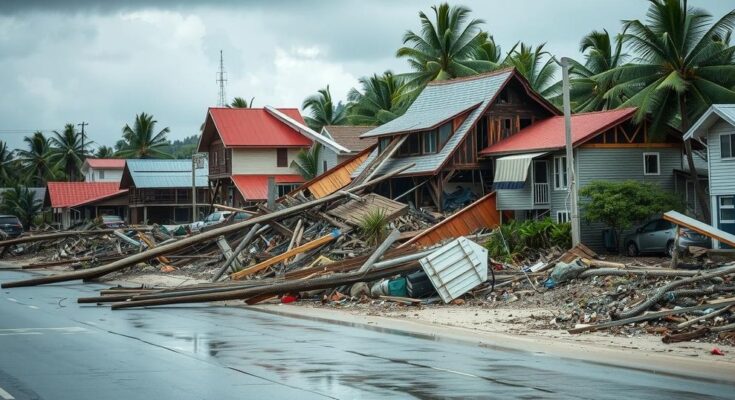Cyclone Chido has devastated Mayotte, causing destruction comparable to an atomic bomb, with reports of at least 11 confirmed deaths and estimates of hundreds more missing. The cyclone’s powerful winds and extensive damage have hindered rescue operations, leaving many areas inaccessible for aid delivery. Efforts are underway to assist the affected population amid the urgent need for humanitarian support.
On Saturday, Mayotte, a French territory in the Indian Ocean, was struck by Cyclone Chido, a Category 4 storm that brought catastrophic destruction. The cyclone’s powerful winds, exceeding 220 kilometers per hour, wreaked havoc across the archipelago, leading to extensive property damage and an alarming increase in casualties. Residents described the scene as resembling an atomic bomb explosion, with entire neighborhoods devastated and emergency services struggling to reach affected areas due to debris blocking access.
The cyclone has left many of Mayotte’s estimated 300,000 inhabitants in dire straits, with official reports confirming at least 11 fatalities, although local officials anticipate the real death toll could climb into the hundreds or even thousands. The Prefect of Mayotte expressed concern that the number of fatalities was grossly underestimated given the widespread devastation observed in slum areas. Furthermore, the cyclone rendered two-thirds of the island unreachable, complicating rescue operations and the delivery of aid supplies.
Chido also impacted northern Madagascar before continuing its path into Mozambique, where it caused additional destruction, but has now weakened. As the storm dissipated, the urgency for humanitarian assistance in Mayotte became apparent. Cellular networks have been disrupted, leaving families unable to communicate and seek news of their loved ones.
Cyclone Chido is noted as the most powerful storm to strike Mayotte in over 90 years, exacerbated by climatic changes, including rising sea levels and increased cyclone intensity due to global warming. Mayotte, struggling with socio-economic challenges such as poverty and unemployment, faces significant barriers in recovering from such natural disasters. The impact of Cyclone Chido reveals the vulnerability of the islands to extreme weather events, particularly for its population living in informal settlements, which are disproportionately affected during such crises.
In conclusion, Cyclone Chido has dealt an unprecedented blow to Mayotte, leaving widespread destruction and a rising death toll. As recovery efforts begin, the challenges posed by the island’s isolation and lack of resources underscore the severe impact of natural disasters in vulnerable regions. The situation calls for immediate international assistance and a re-examination of preparedness strategies in the face of increasing cyclone risks due to climate change.
Original Source: www.cnn.com




